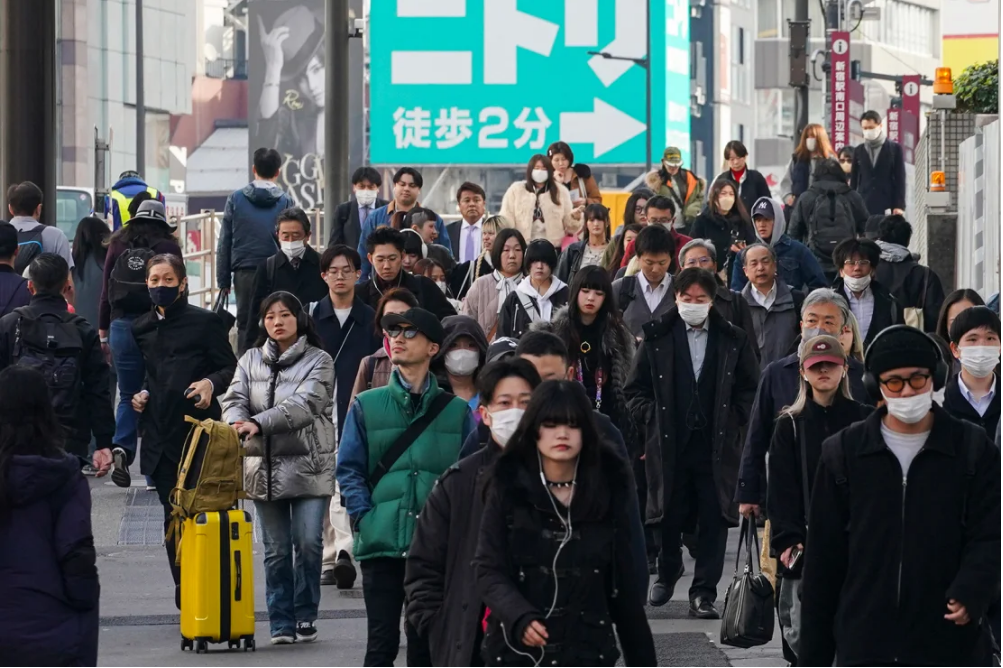The city of Tokyo, the capital of Japan, has announced a groundbreaking plan that could transform the country’s work environment: the introduction of a four-day work week for public employees, set to take effect in April. This change is part of a broader effort to address one of Japan’s most pressing issues – its low birth rate – while also seeking to modernize the rigid labor practices that have defined the country’s professional culture for decades.
This new policy will allow government workers to have three days off per week, offering them more time to care for their families, rest, or engage in personal activities. Additionally, another measure was announced that will allow parents of children in grades one through three of elementary school to reduce their working hours, accepting a slight salary cut, so they can leave work earlier and spend more time with their children.

Tokyo Governor Yuriko Koike is leading the initiative with the goal of promoting a better balance between work and personal life, especially for working mothers, who often face barriers when trying to reconcile their careers with family responsibilities. “We will review work styles with flexibility, ensuring that no one has to give up their career due to life events, such as childbirth or child care,” Koike said during the announcement of the policy. She emphasized that in challenging times for Japan, Tokyo must take the lead in protecting and improving the quality of life for its citizens.
Japan is facing an alarming demographic crisis, with fertility rates steadily declining over the decades. In 2023, the country recorded only 727,277 births – the lowest number ever documented. The fertility rate, which indicates the average number of children a woman has over her lifetime, hit a record low of 1.2, far from the replacement level of 2.1 needed to maintain a stable population. With the rapid aging of the population and a declining workforce, Japan’s economic and social sustainability is at risk.
Sociologically, the decline in birth rates in Japan is closely linked to its work culture, often described as exhausting and relentless. Excessively long working hours, coupled with a culture of overtime as a symbol of dedication, create an environment where balancing work and personal life is nearly impossible. In extreme cases, this culture can lead to the phenomenon known as karoshi, or “death from overwork,” a term that highlights the severe impact of workplace pressure on employees’ health.
Furthermore, gender inequality in the workforce is a significant barrier. Japanese women, though highly educated, face social expectations that often place them in a dilemma: choose between building a career or starting a family. The disparity in workforce participation is evident: in 2023, only 55% of Japanese women were employed, compared to 72% of men, according to World Bank data. This gap is larger than in many other high-income countries and reflects a lack of institutional support for women to balance both spheres of life.
Although Japan is just beginning to explore shorter work weeks, the idea has already gained traction in other countries. In the West, many companies have adopted four-day work weeks as a way to improve employee well-being, reduce stress, and even increase productivity. Studies conducted in countries like Iceland and the United Kingdom showed that workers on reduced hours reported higher job satisfaction and lower burnout rates, while maintaining productivity levels equal to or higher than traditional work schedules.
On the other hand, in Japan, the adoption of shorter work weeks still faces resistance, especially in the private sector, where there is a long tradition of associating hours worked with corporate loyalty. Changing this mindset will be a crucial challenge for the wider adoption of these practices.
Tokyo is not alone in implementing more family-friendly policies. Recently, other regions and countries in Asia have also started adopting similar measures. Singapore, for example, introduced guidelines requiring companies to consider requests for flexible work arrangements, such as four-day work weeks or adjustable hours, as a way to support their workers and encourage higher birth rates.
In Japan, some local governments are adopting additional initiatives to improve family life quality, such as child care subsidies, financial incentives for births, and policies encouraging men to take paternity leave. However, experts point out that isolated policies will not be enough if they are not accompanied by broader cultural and structural changes.
Tokyo’s decision to implement a 4×3 work week represents an important, yet ambitious step towards modernizing its workforce. In addition to offering a better quality of life for public employees, the measure aims to address one of Japan’s most urgent problems – its population crisis.
However, the success of these policies will depend on several factors: the willingness of the private sector to adopt similar changes, the effectiveness of implementation, and the creation of a more robust support network for families and workers. If successful, the initiative could serve as a model for other regions and even countries facing similar challenges. More than a practical response, this policy has the potential to trigger a cultural transformation that redefines the meaning of work-life balance in Japan.
The implementation of the 4×3 work week in Tokyo is more than a labor policy; it is a reflection of how Japan is trying to tackle an unprecedented demographic crisis while modernizing its society. The initiative clearly demonstrates an attempt to balance economic needs with social well-being, acknowledging that outdated work practices are incompatible with current challenges.
Although it is too early to measure the impacts of this measure, it symbolizes a significant shift in mindset, where quality of life and family support begin to be seen as pillars for the country’s sustainability. If Tokyo successfully leads this transition, it could pave the way for other regions in Japan and even worldwide to adopt similar models. In a global context where the search for work-life balance is becoming increasingly urgent, initiatives like this are crucial steps toward building healthier and more balanced societies.

